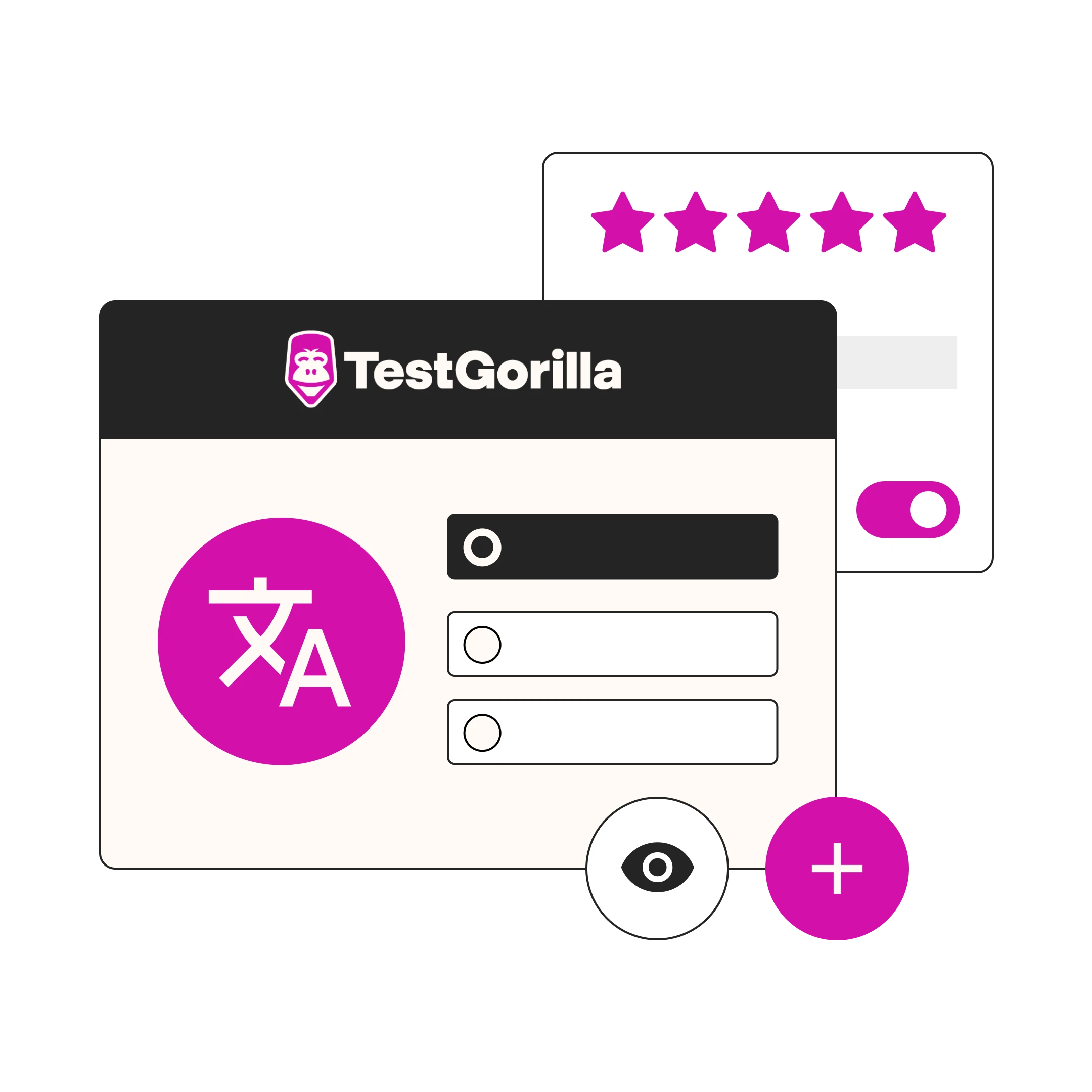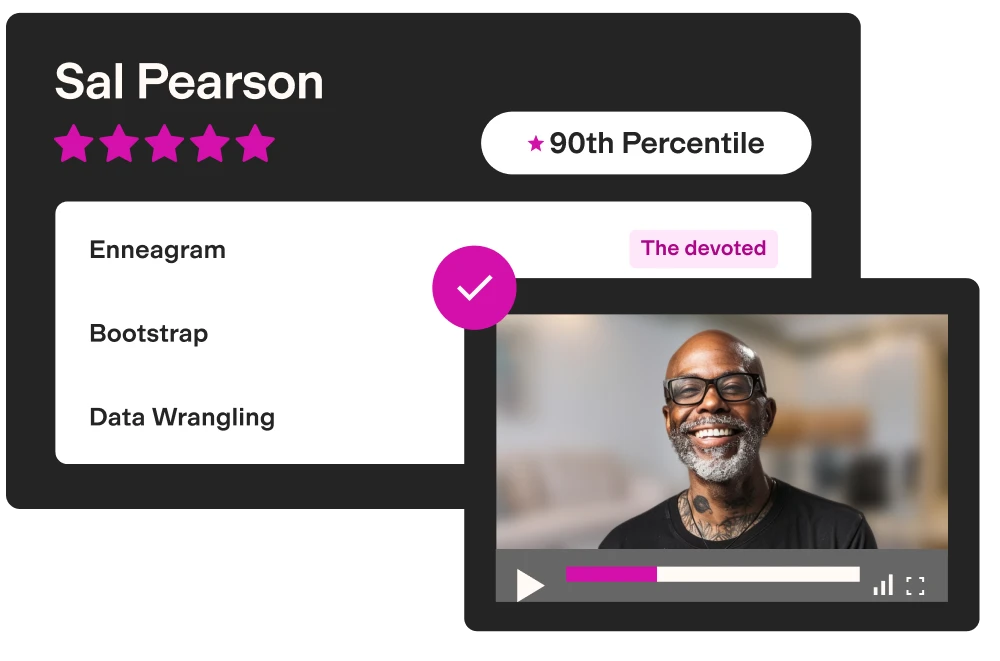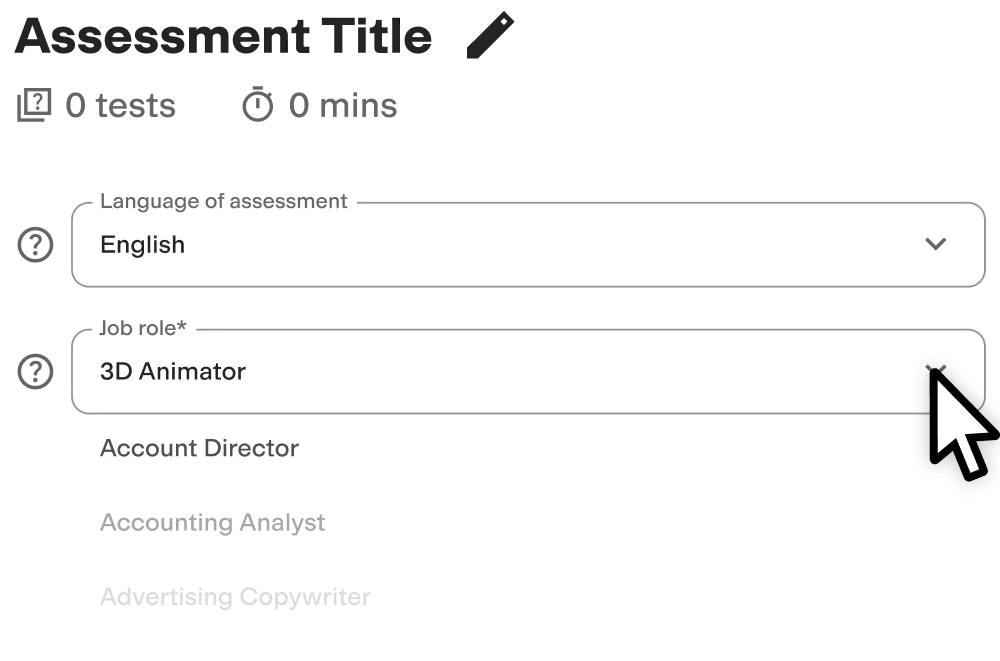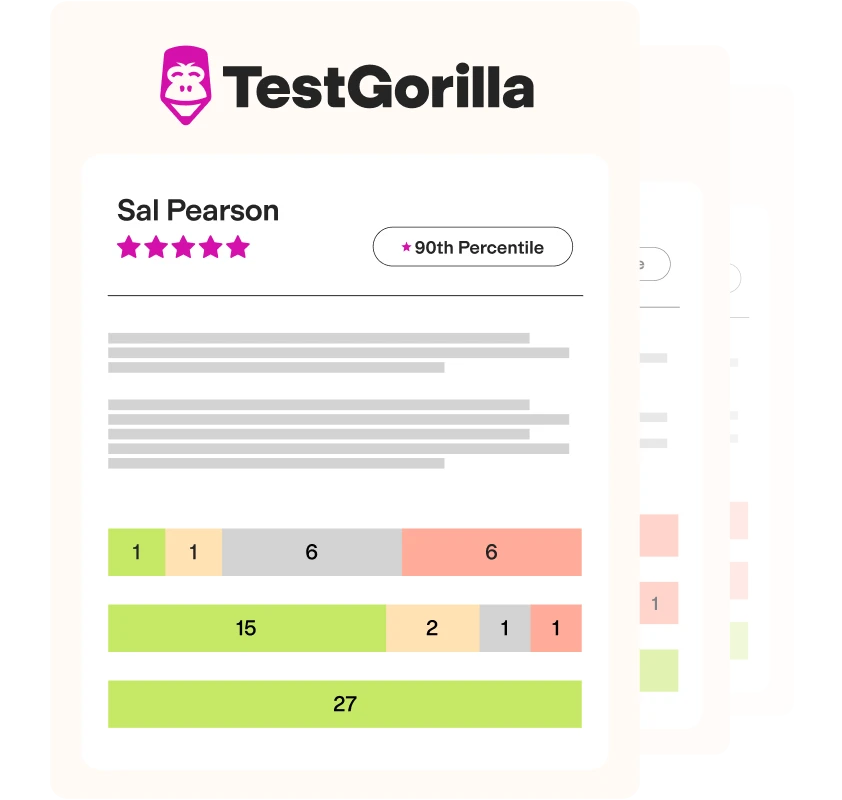Japanese B1 (Intermediate) test: Pre-employment screening assessment to hire the best candidates
Summary of the Japanese B1 (Intermediate) test
The Japanese B1 (Intermediate) test evaluates a candidate’s Japanese proficiency at the B1 level of the CEFR framework. This test will help you hire employees who can communicate in Japanese on subjects commonly encountered at work and in everyday life.
Covered skills
Grammar & vocabulary
Simple sentence composition
Reading comprehension
Listening comprehension
Use the Japanese B1 (Intermediate) test to hire
Customer support agents, sales representatives, and other employees that need an intermediate level of Japanese to perform well in their roles.
About the Japanese B1 (Intermediate) test
Employees with the ability to communicate in Japanese at the intermediate level will help improve your company’s internal and external communications by removing language barriers and improving the flow of information and collaboration among colleagues and to and from customers.
The Japanese B1 (Intermediate) test evaluates a candidate’s ability to communicate at the B1 level of the Common European Framework of Reference (CEFR) for Languages. The test evaluates candidates in the areas of grammar and vocabulary, sentence composition, reading comprehension, and listening comprehension.
Employees who can speak the Japanese language at an intermediate level can communicate with customers, colleagues, and other stakeholders comfortably around daily situations that can arise in the workplace.
The texts and sentences used in the test mimic real-life situations at work and everyday life. Those who score well on this test will be able to understand simple, connected sentences on topics that are generally familiar.
The test is made by a subject-matter expert
Yukari N.
Yukari has a true passion for teaching Japanese language as well as Japanese culture and has experience teaching Japanese to people of all ages in France and Mexico for more than 7 years.She believes that learning foreign languages can broaden our mind and allow us to connect with others from around the world.
Yukari has been interested in foreign languages since she was a child and holds certificates in English, French, and Spanish.
Crafted with expert knowledge
TestGorilla’s tests are created by subject matter experts. We assess potential subject-matter experts based on their knowledge, ability, and reputation. Before being published, each test is peer-reviewed by another expert, then calibrated using hundreds of test takers with relevant experience in the subject.
Our feedback mechanisms and unique algorithms allow our subject-matter experts to constantly improve their tests.
What our customers are saying
TestGorilla helps me to assess engineers rapidly. Creating assessments for different positions is easy due to pre-existing templates. You can create an assessment in less than 2 minutes. The interface is intuitive and it’s easy to visualize results per assessment.

VP of engineering, mid-market (51-1000 FTE)
Any tool can have functions—bells and whistles. Not every tool comes armed with staff passionate about making the user experience positive.
The TestGorilla team only offers useful insights to user challenges, they engage in conversation.
For instance, I recently asked a question about a Python test I intended to implement. Instead of receiving “oh, that test would work perfectly for your solution,” or, “at this time we’re thinking about implementing a solution that may or may not…” I received a direct and straightforward answer with additional thoughts to help shape the solution.
I hope that TestGorilla realizes the value proposition in their work is not only the platform but the type of support that’s provided.
For a bit of context—I am a diversity recruiter trying to create a platform that removes bias from the hiring process and encourages the discovery of new and unseen talent.

Chief Talent Connector, small business (50 or fewer FTE)
Use TestGorilla to hire the best faster, easier and bias-free
Our screening tests identify the best candidates and make your hiring decisions faster, easier, and bias-free.
Watch what TestGorilla can do for you
Create high-quality assessments, fast
Building assessments is a breeze with TestGorilla. Get started with these simple steps.
View a sample report
The Japanese B1 (Intermediate) test will be included in a PDF report along with the other tests from your assessment. You can easily download and share this report with colleagues and candidates.
What is an online Japanese B1 (Intermediate) proficiency test?
The Japanese B1 (Intermediate) test is a pre-employment skills assessment that will help you assess your candidates on their Japanese language abilities at the intermediate or B1 level on the CEFR scale.
The CEFR scale, or Common European Framework of Reference for Languages, has six levels:
• A1 – beginners level
• A2 – elementary level
• B1 – lower intermediate level
• B2 – upper intermediate level
• C1 – proficiency level
• C2 – mastery
Hiring talented individuals with B1-level Japanese isn’t always an easy task. Top candidates are snapped up quickly, so you need to act fast if you want to get the best talent.
That means you may need to change your hiring process, making it more efficient and adaptable to current market needs. Improving your hiring will help you address some of the key problems companies face when recruiting:
Limited talent pool: Most open roles attract more than 200 applications, but that doesn’t mean 200 good applicants. Many candidates use the “shotgun” approach, sending their CVs to as many companies as possible and hoping something sticks. One major issue with this is that your hiring manager needs to go through all those CVs to find a small number of suitable candidates.
Inherent hiring bias: Once the hiring manager creates the shortlist of candidates, you can’t be sure if they’re the best candidates or if they’re just a product of unconscious bias, which is a common issue in CV screening.
Dependence on CVs: Resume screening is an outdated method when it comes to assessing your candidates. Most CVs only show the hiring manager how well a candidate can write a CV, telling them little about their specific role-related skills.
Luckily, a solution to these problems does exist.
What will you be evaluating with the Japanese intermediate test?
The Japanese B1 (Intermediate) test will help you improve your entire hiring process.
Including pre-employment assessments in your hiring process enables you to avoid reviewing hundreds of CVs to find great candidates. Simply add up to five tests to your TestGorilla assessment, including the Japanese (intermediate/B1) test, and invite your applicants to complete it.
The Japanese B1 (Intermediate) test evaluates candidates in the four core areas of language:
• Reading comprehension. Candidates will need to know how to read Japanese at the B1 level.
• Writing proficiency. Candidates will need to know how to write in Japanese at the B1 level.
• Vocabulary. Candidates should be able to speak Japanese at the B1 level.
• Listening comprehension. Candidates will need to listen to spoken Japanese, understand what’s being said, and then respond appropriately.
You should look for candidates with the necessary skills across all four language areas, and the test results will show you which candidates have these abilities.
The test is essential when you’re looking to hire customer support agents or sales representatives who need to have B1 Japanese.
The Japanese B1 (Intermediate) test will provide you with all the necessary data to make informed hiring decisions and hire the best talent from the market. But there’s more to our pre-employment tests than this.
Use this Japanese B1 proficiency test to hire Japanese language experts
The Japanese B1 (Intermediate) test will help you solve many of the problems of conventional hiring methods:
Evaluate hundreds of applications: Your hiring managers will no longer have to deal with the headache of reviewing hundreds of applications. Once you implement pre-employment tests, you won’t have to do CV screening at all. Your hiring manager simply waits for all the applications to come in and invites applicants to take the test with a single click. It makes no difference how many applications there are; it takes the same amount of time.
No more bias: All your applicants will have a chance to take the test and prove their skills. They all get 10 minutes to complete the same test, so the results you receive are objective. In addition, you receive the test results in numerical form, so you can compare candidates easily. This completely removes bias from this part of the hiring process.
No more reliance on resumes: You no longer need to rely on resumes in the hiring process. If you need a candidate for a role that requires intermediate Japanese language abilities, simply give them a Japanese B1 (Intermediate) test.
All that’s left is for you to choose a partner to help you implement pre-employment tests in your company’s hiring process, and this is where TestGorilla comes into play. We’ve helped more than 6,000 companies improve their hiring, and we can help you too.










